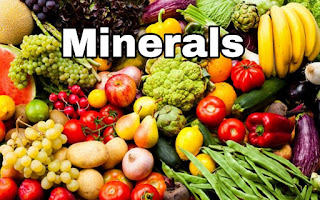VITAMINS & MINERALS.
I. Minerals -:
Minerals are essential in our diet. About 4% of our body weight is made up of minerals. Minerals are required for healthy teeth and bones and muscles. Minerals are also used my body for various activities such as transmission of nerve impulses, formation of hormones, maintenance of heartbeat, etc. Minerals can be classified into macro minerals ( major minerals) & micro minerals ( minor minerals). Micro mineral is required by our body in large quantity as compared to micro minerals.
Types :-
A. Macro Minerals -:
1. CALCIUM - Calcium is among the top macrominerals in terms of growth and development of our bones and teeth. It makes the teeth and bones strong and healthy. It helps in blood clotting. Its deficiency may causes rickets. Main sources of calcium are cheese, milk, orange juice, yogurt, eggs, etc.
2. POTASSIUM - It is one of the most important minerals in diet. It is helpful in keeping the nervous system and muscular System fit and active all the time. It helps in maintaining the amount of water in blood and tissues. Main sources of potassium are banana, tomatoes,green leafy vegetable, peanut, citrus, etc.
3. SODIUM - sodium helps in muscular activities. It also helps in the transmission of nerve impulses. Main sources of sodium are table salt, pickles, butter, etc.
4. MAGNESIUM - it repair and maintenance body cells. Main sources of magnesium are meat, brown rice, beans, whole grains, etc.
5. PHOSPHORUS - Phosphorus helps in the formation of bones and teeth. It keeps the muscles and nerves activities normal. Main sources of Phosphorus are egg, fish, cod liver, milk, unpolished rice, etc.
B. Micro Minerals -:
1. IODINE - It helps in production of hormones in thyroid gland. It is also significant for proper growth and development of the body. Lack of iodine can cause goitre and mental retardation. Main sources of iodine are fish, seafood and iodised salt.
2. IRON - it is essential in production of haemoglobin. Its deficiency causes anaemia. Main sources of iron are meat, egg, dry fruits, spinach, banana, and green leafy vegetables.
3. CHROMIUM - It stimulate insulin activity. Its deficiency main causes diabetes. Main sources of chromium are soyabean, blackgram, carrot, tomato, etc.
4. COPPER - It helps iron in the formation of haemoglobin. It is found in eggs, pulses, etc.
5. COBALT - It protects us from anaemia and is found in green leafy vegetables, milk and meat.
II. Vitamins -:
Vitamins are chemicals, which are required in very small amount to keep our body healthy full stop if a particular vitamin is not present in our diet, it may causes a deficiency full stop for example if vitamin C is not included in diet coma it will causes scurvy. All the vitamins are organic chemicals. There are two groups of vitamins, fat soluble vitamins & water soluble vitamins.
Types :-
A. Fat Soluble Vitamins -:
1. VITAMIN A - This vitamin is formed by the elements of hydrogen carbon and oxygen. It is helpful in the formation of bones and teeth. It also promotes normal vision. It also provides resistance to infections. Its deficiency leads to night blindness, keratomalacia and xerophthalmia. Main sources are cod liver oil, animal liver, egg yolk, milk and milk products, mango, papaya and yellow vegetables.
2. VITAMIN D - It is formed by the elements of carbon hydrogen and oxygen. It is a white crystalline substance. It helps in absorption of calcium and phosphorus. It maintains the normal functioning of parathormone, the hormone secreted by parathyroid gland. Its deficiency may causes rickets, dental cavities, and osteoporosis. Main sources of vitamin D are sunrays, milk, butter, fish liver oils, etc.
3. VITAMIN E - It is an important vitamin required for growth of many organs in our body. Generally the deficiency of vitamin E is rare but it can occur in people with certain genetic disorders and in very low weight, premature infants. Its deficiency may causes anaemia or low red blood count, which may affect our body's ability to produce sex hormones that promote the function of reproductive system. Main sources of vitamin E are are green vegetables, sprouts, coconut oil, yolk, dry fruits, milk, meat, butter, etc.
4. VITAMIN K - The main functions of this vitamin is to clot the blood. It also helps in the prevention of hemorrhage and excessive bleeding in wounds. Its deficiency may causes anaemia. Its main sources are tomato, potato, spinach, cabbage, soyabean, etc.
B. Water Soluble Vitamins -:
1. VITAMIN C - This vitamin is also known as ascorbic acid. It is a water soluble vitamin. This helps in healing the wounds. It increases metabolic rate and is helpful in absorbing calcium. It is also a highly effective antioxidant. It is also essential for formation, growth and repair of bones, skin and connective tissues. Adults may feel tired, weak and irritable due to deficiency of vitamin C. Main sources of vitamin C are lemons, pineapples, Amla, oranges, tomato, green chillies, etc.
2. VITAMIN B Complex - vitamin B consist of 8 soluble vitamins that plays important role in cell metabolism. Earlier they were thought to be a single vitamin but later, research showed that they are chemically distinct vitamins. Now they are referred to as vitamin B complex. A brief description of these vitamins is given below...
Vitamin B1 : This vitamin is also called thiamin. This is a colourless vitamin. It helps in metabolising carbohydrates. Its deficiency may causes constipation, irritation and anger. Development of body stops, if there is any shortage of vitamin B1.
Vitamin B2 : This vitamin is yellow in colour. It is usually destroyed in sunlight and also if the food is cooked for a longer time for stop it helps in preserving and maintaining the characteristics of youth. Its deficiency decreases immunity power of white blood corpuscles, stunted growth, unhealthy skin, etc.
Vitamin B3 : It is a water soluble vitamin so our modern does not store it. This means that our body can excrete excess amount of vitamin if it is not needed. It's deficiency may causes pellagra. Symptoms of its deficiency include indigestion, vomiting and depression.
Vitamin B5 : it is necessary for making blood cells. It plays a vital role in The breakdown of fats and carbohydrates for energy. The deficiency of this vitamin may include the symptoms such as fatigue, insomnia, depression and irritability vomiting, etc.
Vitamin B6 : This mitron main is vital for formation of haemoglobin. It also keeps the skin healthy.
Vitamin B12 : It is red in colour. This vitamin is usually destroyed if food is cooked for a longer time. Its deficiency main causes anaemia.
Vitamin B9 : It is tasteless, Odourless and yellow in colour. Simple cooking can destroy this vitamin. It is very essential for reproduction, growth and development of body. This vitamin is helpful in blood formation. The deficiency of folic acid may cause loss of leucocytes.
Vitamin B7 : Its chemical name is biotin. Its efficiency may lead to impaired growth, depression, muscle strain, etc.
Thankyou for visiting.









Comments